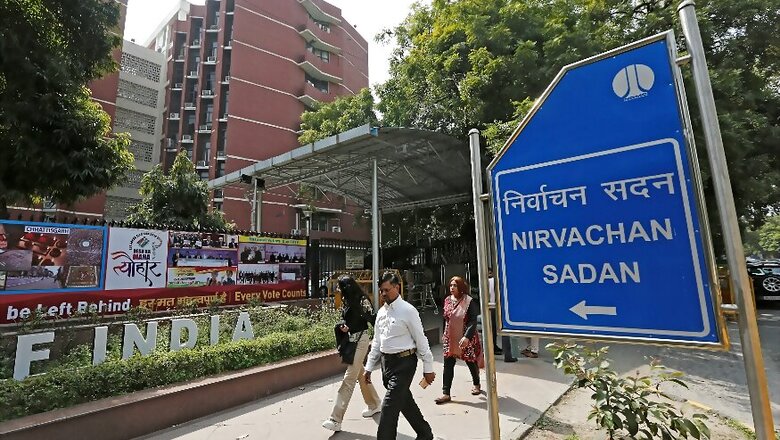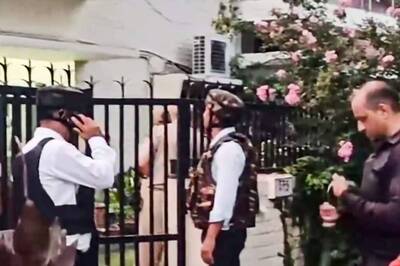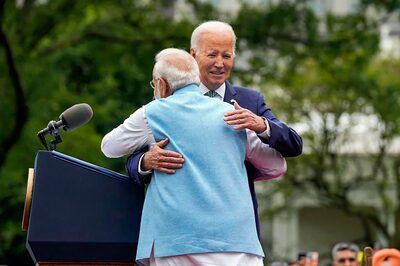
views
Something is rotten in the state of mind of India. Especially when the matter is related to freedom of expression. The institutional response to anything objectionable is repressive: ban it, penalise it. These days the Election Commission has emerged as the self-appointed regulator of free speech — acting against anything it doesn’t approve of.
It recently stated that the Vivek Oberoi-starrer PM Narendra Modi should not be released “till May 19”. Which means that it persists with its stand that it conveyed to the Supreme Court earlier: that the movie — with its dialogues, symbols, and presentation — “eulogises a public representative”.
So what? The right to freedom of expression includes the right to eulogise anybody one feels like. The Modi biopic has been criticised and ridiculed for being a hagiography — perhaps correctly if the trailer is anything to go by — but then to write or create hagiographies is also part of free speech.
If eulogies, hagiographies, mass propaganda etc. could help politicians retain their office in India, there would seldom have been any change of government. The view that a favourable depiction of Modi — or for that matter anybody else — in a movie would sway the electorate is illiberally patrician. For it presupposes that the people of India are dangerously credulous, if not downright gullible and foolish; and, therefore, they should be saved from themselves. This is wrong; there have been instances in the past when leaders with huge resources lost, while those with little campaigning emerged victorious. George Fernandes, for example, won the election while in prison.
Besides, if people are so foolish that they can get swayed by a movie, then there is anyway no hope, for the resourceful will unfailingly find ways of fooling them. More importantly, what’s the point of having a democracy if the voters are gullible?
Then there is also the issue of timing. The Akshaye Khanna-Anupam Kher-starrer Accidental Prime Minister was also said to be a propaganda movie, aimed at promoting the agenda of the ruling party. So, if the makers of Modi biopic had decided to release it a few months ago, would that have been okay? Won’t its alleged eulogising have unduly influenced the voter?
It is not just the Modi biopic but also over the statements made by various leaders that the poll panel has been showing excessive zeal. This is not to say that the coarse remarks made by our politicians should be condoned; indeed they should be, and have been, condemned in public discourse. And that should be enough.
The Himachal Pradesh chief of the Bharatiya Janata Party using un-parliamentary language about Congress president Rahul Gandhi doesn’t need a reprimand from the poll panel to get exposed. Neither he nor his party got covered in glory by the vituperation. Nor does Azam Khan need to be chided by it to be known as a foul-mouthed leader. Let people know what kind of candidates are in the political arena and let them choose whom they want as their representatives. Why should the EC act as a school master all the time?
In fact, the commission not just violates the right to freedom of expression but also helps conceal the real nature and character of politicians. In a democracy, people choose their rulers, so the choice ought to be well-informed. It would be better if the contesting candidates and other leaders are allowed to express their thoughts and feelings without fear of the poll panel or others; only then their true selves will be known. If you want to know somebody, let them express themselves freely. Let it be a free-for-all.
It can be argued that political debate will get further vitiated; but the point is that, despite the martinetish EC, the ubiquitous media, and social media, politicians do make execrable remarks. Further, the EC can act only during the election period; most of the time, politicians are anyway without any school master. The laws that deal with issues like libel and public disorder should suffice during poll campaigns. Furthermore, the benefits of a free-for-all far outweigh its anticipated negatives.
The EC has asked Pragya Singh Thakur, the BJP candidate for the Bhopal Lok Sabha constituency, to explain her remarks on slain Mumbai Anti-Terrorist Squad (ATS) chief Hemant Karkare. She had asserted that Karkare was killed in the 26/11 Mumbai attack because she had cursed him. She claimed that Karkare had tortured her when she was in police custody in the Malegaon blast case.
Now, deplorable though her assertions are, isn’t it good that she has mouthed them? This means that anybody casting vote for her in Bhopal would know what kind of person they want to send to Parliament. Ditto with the supporters of Azam Khan who is fighting the BJP’s Jaya Prada in Rampur.
It is not my case that decency and decorum should have no place in political discourse, but the thing is that it cannot be enforced by the EC’s fiat or even legislation. It can happen when politics gets illumined by reason and temperance; the commission’s overreach is futile.
(The author is a freelance journalist. Views are personal)

















Comments
0 comment